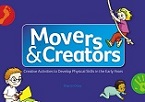TRAINING
With a wealth of experience in training and educating both professionals and the general public, Smart Consultancy and Coaching can offer a wide portfolio of topics. Our philosophy is to ensure that our presentations are not only enjoyable, informative and up-to-date, but focus on the practical aspects of the topic and their relevance to everyday application.
To discuss your training needs, please contact us for further information.
The following offers examples of training programmes available:
| Foundation Phase/Stage; | Primary |
| Whatever the Weather Sticky Fingers On Your Marks Busy Bodies We Can Play too Do and Discover |
Can’t Write Won’t Write Take Ten Get the Ball Rolling Smart Moves Additional courses options |
Secondary |
Adult Education |
| Supporting Learners with Developmental Co-ordination Disorder | Supporting Students with Specific Learning Difficulties (including co-ordination disorders, ADHD, Dyslexia and Aspergers Syndrome) |
Workplace |
|
| Supporting Employees With Specific learning Difficulties (including co-ordination disorders, ADHD, Dyslexia and Aspergers Syndrome) |
Primary
Who should attend:
Teachers, SENCO’s Teaching Assistants/Learning Support Assistants
Location:To be provided by the host organisation
Duration:; Half or full day workshops available
In order to meet your training needs we are able to mix and match programme contents, so feel free to contact us to discuss your requirements.
Can’t Write Won’t Write
A large percentage of the school day involves writing related activities. Despite technological developments, handwriting remains the primary means of recording information in schools today. In many classrooms there are children with a developmental co-ordination disorder, who find it difficult to write swiftly and fluently enough to cope with the demands of the curriculum. As a result school can be a source of constant frustration for these children whose finished work often does not reflect their abilities.
Implications of children’s handwriting difficulties for teaching and learning:
- Full participation in all aspects of the curriculum
- Ability to demonstrate knowledge and understanding
- Presenting neat and legible work
- Maintaining pace with peers
- Idea generation, organisation and sequencing of written work
- Working independently
- Copying information from text or board
- Meeting with requirements for SATs
The teacher and support staff can play an instrumental role in preventing secondary issues from arising as a result of frustrations with recording. Often this can be achieved by having a greater understanding of the issues faced by these children and being able to implement practical strategies which can be incorporated into on routine teaching and learning situations
What will you take away?
- An understanding of the issues relating co-ordination disorders and writing
- Mechanisms for assessing handwriting difficulties
- Approaches to involve the children in developing mechanisms for recording
- Inclusive ideas and strategies for the classroom
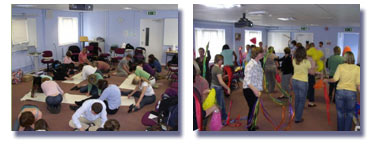
SMART MOVES
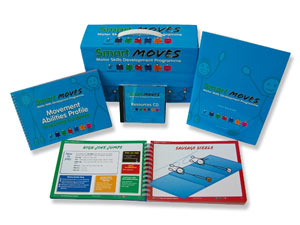 This is an introduction to implementing a motor skills development programme for children with co-ordination difficulties and related developmental disorders. This programme has been devised by Sharon Drew and is being successfully implemented in many authorities across the UK. The programme can be used as a specific ‘catch up’ scheme to develop gross motor skills or as an integral part of the PE and games curriculum.
This is an introduction to implementing a motor skills development programme for children with co-ordination difficulties and related developmental disorders. This programme has been devised by Sharon Drew and is being successfully implemented in many authorities across the UK. The programme can be used as a specific ‘catch up’ scheme to develop gross motor skills or as an integral part of the PE and games curriculum.
This is a one day workshop with a mixture of theory and hands-on activities. It has the ability to be delivered in two formats:
A. Based on the availability of a suitable venue and a small group of primary-age children to undertake specific activities.
Participants are able to gain hands-on experience by working with the children to gain practical knowledge of how use the screening and programme..
This has proved to be a very popular and successful delivery mode which both children and participants have enjoyed very much. There is a maximum of 30 participants for this option and a minimum of 10 children.
Note: Permission will need to be sought in accordance with local policy and procedure
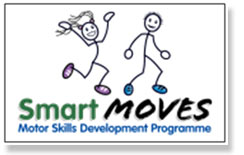 B. This option whilst still requiring a suitable venue is delivered without the participation of children and offers a more general overview of the programme and its tools. The presentation will draw upon video footage and practical exercises to gain an understanding of the programme’s application.
B. This option whilst still requiring a suitable venue is delivered without the participation of children and offers a more general overview of the programme and its tools. The presentation will draw upon video footage and practical exercises to gain an understanding of the programme’s application.
There is a maximum of 50 participants for this option.
Delegate fees will include a free copy of the Smart Moves Motor Skills Development Programme in both training options.
To discuss your requirements for these dynamic training options, please contact us

Take Ten
Many teachers will have children in their classes who experience difficulties using their hands with precision and control to hold and use a pencil, control scissor and manipulate construction materials. There may be several reasons for this; a lack of pre-school experience, differing rates of development, gender, or there may be a specific cause.
Children who need help and support in this area may require a variety of approaches to develop their fine motor skills. This may be a specific catch up programme, a particular piece of equipment to make the task easier, or an adjustment to the environment. This informative but fun packed workshop will provide you with a range of skills and practical tools to try out in your settings.
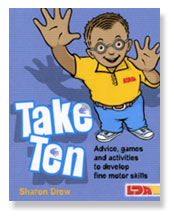
What you will take away?
- Understanding of the requisites for fine motor skills
- Tips for assessing fine motor skills and target setting
- Lots of ‘easy to implement’ activities that require few and commonly found resources within the classroom.
Each delegate will also be provided with a copy of Take Ten written by Sharon Drew.
Get The Ball Rolling
Many children with co-ordination difficulties find it hard to participate fully in PE and games lessons as well as join in everyday play ground games with their peers. This interactive workshop will give you the opportunity to consider the way in which children move as well as add to your repertoire of games and activities to use in your settings. This workshop gets very physical so come in comfortable clothing and suitable footwear.
What will you take away?
- Understanding of movement difficulties for children with developmental co-ordination disorders
- Tips for assessing gross motor skills and target setting
- Ideas for low cost no cost equipment and resources to add to your PE cupboard
- Oodles of new games to use in PE, after schools clubs or even the classroom
Other Options
Sharon is also able to deliver training on a variety of other topics. As with all of the training, the sessions are a mix of theory and practical with lots of ideas to take away.
- Developmental Co-ordination Disorder (Dyspraxia)
- Supporting children with Physical Disabilities
- Supporting adults with specific learning difficulties in the workplace
- Supporting students with Developmental Co-ordination Difficulties in FE/HE
A tailor made programme can be devised to suit your particular training requirements. Please feel free to call us to discuss your specific needs.


